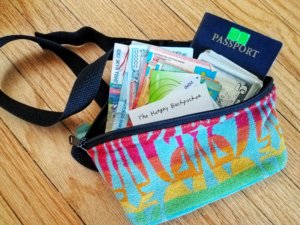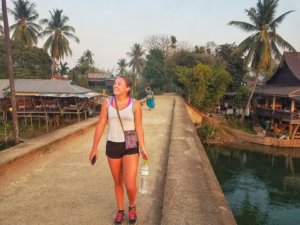The difficulty in packing light intensifies when it comes time to load up the little things. These odds and ends quickly multiply.
When the goal is to pack light and avoid cluttering your backpack, it is hard to determine exactly what small items are necessary to pack while not weighing yourself down.

Items such as serious medications and money are easy decisions, but the process is more complex. After you’ve loaded your backpack with clothes, it’s time to fill in some of the empty spaces. What extras should be carried for the next few months?
Now that the backpacking basics and keeping your feet happy have been covered, the third part of our series on tips for packing light and packing right is focused on the little things.
Here’s a breakdown of the little things to help you pack right for your backpacking adventure:

Contents
Packing Medicine
I am not a doctor. See your physician before any long-term voyage and get the appropriate vaccines for your destination. Seriously, do this. Vaccinations can be expensive and tedious, but not near as costly as a rate tropical disease or treatment for chronic illness for years to come.
If there is a serious medication that is needed, obviously this is not something to leave behind.
With a serious food allergy, I carry multiple EpiPens when traveling. Language barriers can be difficult, and sometimes an assurance of no tree nuts means extra tree nuts. Traveling with a food allergy is stressful at times, but this should not keep anyone at home. Travel prepared.

Basic medications are little things that should be on any packing list. Neosporin is hard to come by in less-developed nations. Tylenol can be costly, so pack a small bottle. Band-aids are also a useful item to keep on hand.
This is not the most appealing topic, but it seeds saying. Anti-diarrheal medicine is crucial! When it comes to getting the screaming shits, it’s not about if – it’s about when. I was prescribed azithromycin which saved my life many times. On the opposite end of the intestinal spectrum, bring some laxatives. The same food that confines you to the bathroom and turns your ass into Niagara Falls might stop you up like the Hoover Dam. Laxatives in Asia are not dependable, except for Burmese pig brains. This always works.

Many countries are not open to foreigners bringing in prescription medications. For instance, it is illegal to bring your ADD/ADHD meds into many nations, including Thailand. The odds are that you will not run into any trouble.
A doctor’s note does not legally mean a damn thing in most countries. If the authorities want to confiscate a bottle of pills, they can and will. This goes for most controlled substances. Just because you can go to a pharmacy in Vietnam and ask for serious painkillers – and receive them! – does not mean immigration and customs agents will let it slip.
Just in case, bring a doctor’s note and be discreet. The note may work and sometimes pleading ignorance helps.
Be prepared for the consequences of transporting controlled substances away from home. A lot of these situations are confusing, but there is nothing you can do. Consider all of the warnings. Most likely, there will be no trouble with personal medications.
Travel Insurance – The Biggest Little Thing
Please, for your sake, it’s a good idea to have travel insurance in case something goes wrong. Most accident and health insurance does not cover policy-holders in foreign countries. Travel insurance is not cheap, and hopefully it is never needed, but it is a blessing in a tough time.
World Nomads is the most widely respected and used travel insurance, loved by travel bloggers and serious travelers. World Nomads offers travel insurance to travelers from over 140 countries. It is simple, easy to use and provides loads of helpful information. We like World Nomads because of the 24-hour support and simplicity.
Even for short international trips, it is a good idea to have travel insurance. You never known when or where problems may arise, like the time I had a frightening taxi ride in Bangkok. Fortunately, I was unharmed.
Strongly consider adding travel insurance to your list!
Light Packing & Daily Necessities
Believe it or not, the rest of the world uses toothpaste, too. Even in the unknown corners of Asia, people wash their hair. They even use deodorant! Overpacking bathroom supplies seems like a good idea, but all those travel-size bottles will suddenly occupy a lot of space.
I bought deodorant in Azerbaijan that has lasted for months. It is a common international brand and it works. I don’t stink. At least no one tells me if I do…


Don’t be the dumbass who packs five toothbrushes, three massive bottles of shampoo and a jug of conditioner. Packing light includes some little things, not all of them. Target sells travel size items for a reason, and I promise you will survive without hairspray and organic moisturizer nonsense.

In tropical destinations, mosquitoes can be a maddening nuisance. In many underdeveloped regions, mosquito-transmitted diseases like malaria continue to pose a risk. With no vaccine available, antimalaria pills and mosquito repellent with DEET are the most common form of prevention.
Mosquito repellent can be pricey in remote corners of the world. It’s best to bring a small can when traveling to areas with dense mosquito populations. In some of these areas, while everything else is incredibly cheap, you can blow half a day’s budget on a can of bug spray.
Sunscreen is not difficult to find in beachy tourist areas, but the price can be inflated. When packing, the price is not the concern, but instead the quality of the product in developing nations. For fair-skinned travelers, it is best to bring a reliable bottle of sunscreen from home.
Don’t pack an entire bathroom of supplies. Many travelers, myself included, make this mistake. Replenish your supplies! Pack small items to suffice for no more than one month. Plan ahead and replenish when necessary.
How Much Money Should You Pack?
Bring that cash money! Paper money is always good to have. The question is how much? Personally, I do not like to travel with much cash, and I try my hardest not to use it. Local currency exchanges are a great way to lose a lot of money and legally rip off travelers. I use local ATMs until I have no other option.
That being said, bring multiple credit/debit cards. Foreign ATMs are finicky and frustrating at best. Some cards may not work at all or your bank may suddenly decide that you shouldn’t be abroad and freeze your account. Having a multiple options to withdraw money is good practice for long-term travel.

Do not keep all of your cash and cards in the same place. If you lose your wallet, you’ll be relieved to have another stash. I can personally verify the importance of this. Money belts and fanny packs are the butt of plenty of jokes. In spite of this, many seasoned travelers will be seen sporting these unfashionable pieces. Be smart and follow their example.
Packing Little Things: What electronics do you need?
Leave the laptop at home. If the desire for connectivity is too fierce, think about packing a tablet instead. This can also serve as your library of books, saving your backpack from the volume of your reading list.
Getting lost is one thing. Trying to find a hostel in deserted, freezing and poorly-lighted streets of Bulgaria after midnight with a dead cell phone is another.
Portable chargers have come a long way in terms of quality and size. Ten years ago, these chargers were revolutionary. Today you can buy something the same size with 10x the charging ability. I purchased a Mophie Powerstation a few years ago. About the same size as my smartphone, it is not cheap; but with unpredictable battery lives courtesy of Apple and Samsung, this has been a tremendously prudent investment.

Phone chargers and charging cubes are available everywhere. Bring an extra charger and an extra cord. The cheap replacement options available in the far corners of the world are unreliable. They may work well, or they may not work at all.
Buy an extra memory card for your phone or camera. The last thing you want is to be in the middle of a fascinating place and scrambling to delete files and photos so you can snap a couple pics.
Adapters are an important thing to have in your backpack. Inconveniently, different regions of the world have different outlets. Forget about the reason why, focus on what you need to pack.

Fortunately, many hostels and hotels have installed wall outlets that are compatible for most travelers. However, the farther from the beaten path you travel, accommodation becomes less accommodating. Adapters can be bought in most cities, but are difficult to find in small towns and villages. If your adventure is taking you to multiple regions of the world, bring a universal adapter. Despite being on the clunky side, these adapters are perfect for long-term travelers.
A small Bluetooth speaker is always in my backpack. Music is important to me, and I prefer not to wear headphones on a beach or while hiking. I carry an iHome iBT82 portable, waterproof speaker that weighs less than 0.20 pounds. The speaker has a great battery life, uses the same charger as my smartphone and gets surprisingly loud.
Sunglasses
Friends know me as one of those people who always wears sunglasses. Even on dreary days when the sun is nowhere to be found, I’ve got my shades on. Not only do I prefer to shield my eyes, it’s nice to know that people can’t tell exactly where my gaze is fixed. Creepy? Whatever, but I also feel more comfortable wandering when locals stare down the tourist walking through. Motorbike and tuk tuk rides will leave your eyes feeling abused. Best to set off with a pair or two of quality frames.
When it comes to sunglasses, I wear Maui Jim almost exclusively. These shades are not cheap, but they are the absolute best. When people make the switch to Maui Jim sunglasses, they don’t change back.

Little Things: Miscellaneous Packing
Of all the little things that wind up in a backpack, which ones fit with a goal of packing light?
A small flashlight can really come in handy when visiting less developed places in the world. Yes, smartphones have flashlights. But batteries die unexpectedly, and leaving a thousand dollar phone unattended on the beach is not advised.
Sometimes the lack of power is a relief. A nighttime walk through the jungle, down a bumpy dirt trail to the beach on a small, off-the-grid Cambodian island, has a certain mystique. When the same Cambodian island is home to lethal pit vipers, a flashlight – and a bit of loud stomping – provides light and peace of mind.
Cities are not necessarily any better. Third world countries are known for having unreliable power grids. Many cities in Myanmar (Burma) have daily power outages. The city of Mandalay in Upper Burma is a large, culturally important city, but culture does not make infrastructure more reliable. The sidewalks in this city have gaping holes leading straight down to freely flowing sewage. Being caught in a power outage at night on these streets could be disastrous. Unless you have a small flashlight!

Hand sanitizer is an easy addition to a packing list. It is cheap and small. In developing nations, soap is rarely antibacterial and the water is – well, we all know about the water. Hand sanitizer is an easy way to help prevent serious illness.
A pocket sewing kit, or simply a needle and thread, can be very useful for an unexpected wardrobe malfunction. Unless you’re in East Asia and a large human like myself, clothes shopping can be fun and cheap.
But what if something a little more important needs mending? After two long backpacking trips, dozens of flights, camping and hiking trips, my backpack strap ripped at the seem. In a small village in Southeast Asia. Thanks to that pocket sewing kit and my girlfriend’s help – okay, she did it all – my backpack was stitched up and lasted for several more months.
Passport photos are required for entrance into many countries. Even countries with sufficient technology available may require you to hand over a photo. Packing a few can save you from a serious headache at border crossings. Also, bring one or two paper copies of your passport. Your passport is for more than merely getting in; in the event that you lose your passport, it is good to have a copy.
Packing Light: The Little Things
Packing light is the most common tip given to backpackers and travelers, but it is oversimplified. It may be easy to pack light for a week or two away, but packing the little things for long-term travel, several months or even years on the road, is a more serious consideration.
All of this information may seem redundant, boring or overwhelming, but it is important. Having a positive adventure starts before day one. It begins with packing, with the preparation leading up to departure. Using these tips for packing the little things will enable any backpacker to travel happier, freer and longer.

**I only recommend products that I personally use. No one has paid me to endorse any of the products in this post. However, this post contains some affiliate links. I may receive a small commission from purchases made through these links – at NO additional cost to you.
Very informative and helpful article.